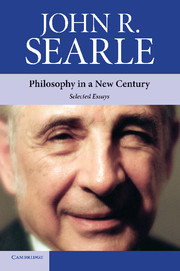Book contents
- Frontmatter
- Contents
- Original place of publication of the essays
- Introduction
- 1 Philosophy in a new century
- 2 Social ontology: some basic principles (with a new addendum by the author)
- 3 The Turing Test: fifty-five years later
- 4 Twenty-one years in the Chinese Room
- 5 Is the brain a digital computer?
- 6 The phenomenological illusion
- 7 The self as a problem in philosophy and neurobiology
- 8 Why I am not a property dualist
- 9 Fact and value, “is” and “ought,” and reasons for action
- 10 The unity of the proposition
- Name index
- Subject index
- References
4 - Twenty-one years in the Chinese Room
Published online by Cambridge University Press: 05 June 2012
- Frontmatter
- Contents
- Original place of publication of the essays
- Introduction
- 1 Philosophy in a new century
- 2 Social ontology: some basic principles (with a new addendum by the author)
- 3 The Turing Test: fifty-five years later
- 4 Twenty-one years in the Chinese Room
- 5 Is the brain a digital computer?
- 6 The phenomenological illusion
- 7 The self as a problem in philosophy and neurobiology
- 8 Why I am not a property dualist
- 9 Fact and value, “is” and “ought,” and reasons for action
- 10 The unity of the proposition
- Name index
- Subject index
- References
Summary
I want to use the occasion of this volume dedicated to the twenty-first anniversary of the Chinese Room Argument to reflect on some of the implications of this debate for cognitive science in general, and indeed, for the current state of our larger intellectual culture. I will not spend much time responding to the many detailed arguments that have been presented. I have already responded to more criticisms of the Chinese Room Argument than to all of the criticisms of all of the other controversial philosophical theses that I have advanced in my life. My reason for having so much confidence that the basic argument is sound is that in the past twenty-one years I have not seen anything to shake its fundamental thesis. The fundamental claim is that the purely formal or abstract or syntactical processes of the implemented computer program could not by themselves be sufficient to guarantee the presence of mental content or semantic content of the sort that is essential to human cognition. Of course a system might have semantic content for some other reason. It may be that implementing this program in this particular hardware is sufficient to cause consciousness and intentionality, but such a claim is no longer Strong Artificial Intelligence. It is at the very heart of the Strong AI thesis that the system that implements the program does not matter. Any hardware implementation will do, provided only that it is rich enough and stable enough to carry the program.
- Type
- Chapter
- Information
- Philosophy in a New CenturySelected Essays, pp. 67 - 85Publisher: Cambridge University PressPrint publication year: 2008
References
- 2
- Cited by



